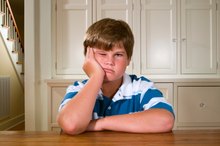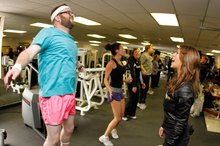What does fact checked mean?
At Healthfully, we strive to deliver objective content that is accurate and up-to-date. Our team periodically reviews articles in order to ensure content quality. The sources cited below consist of evidence from peer-reviewed journals, prominent medical organizations, academic associations, and government data.
The information contained on this site is for informational purposes only, and should not be used as a substitute for the advice of a professional health care provider. Please check with the appropriate physician regarding health questions and concerns. Although we strive to deliver accurate and up-to-date information, no guarantee to that effect is made.
How to Lose Weight When You Are 57 Years Old
You might think that because you are growing older, you have to submit to the effects of your slowing metabolism. Feelings of lethargy, gaining weight without a change in diet and an overall sense of poor health come with age if you are not proactive in keeping yourself healthy. Losing weight at 57 or older can be a challenge, but the mental and physical benefits of keeping the weight off and maintaining an active lifestyle are not so far out of reach. With a few changes to your eating and exercise habits, you will be feeling healthy, fit and youthful in no time.
Keep a food log. Writing down what you eat and when you eat it allows you to get a general picture of your nutrition. Do you snack mindlessly throughout the day? Is your diet composed primarily of fresh fruits and vegetables or processed foods? Notice the trends and replace bad habits with good ones.
How to Lose 45 Pounds in 2 Months
Learn More
Cut calories 2. Start by eliminating or eating less of foods with empty calories, like soda or candy. Replacing sugary drinks with fresh fruit or vegetable juices, and processed snacks with carrots or apple slices are simple ways to improve your nutritional habits. As you progress, cut down on your portion sizes. One portion of any dish should be about the size of your fist.
Eat small meals throughout the day. Snacking on healthy foods at regular intervals helps your metabolism to stay consistent and work more efficiently. Keeping your metabolism at a consistent level will allow your body to burn calories at a regular rate, rather than slowing down at varying times throughout the day.
How to Lose 50 Pounds in Six Months
Learn More
Exercise daily. Start out with at least 30 minutes of exercise a day and add minutes in increments, as you feel ready. Walking is considered a low-impact and easy way to boost your cardiovascular health and burn calories without taking too much effort.
Find a buddy. Having someone to exercise with or to try new, healthy recipes with helps keep your morale up and can keep an exercise routine fun and exciting.
Take supplemental vitamins. As you get older, losing weight isn’t just about counting calories; it includes overall health, too. By keeping your body healthy overall, you will be able to function at your best.
Drink a lot of water. Remaining hydrated helps flush out toxins and keeps you feeling full, stemming those hunger pangs.
Tips
There are many websites that can help you determine the appropriate amount of calories you should eat per day and how often you should exercise based on your height and weight. For example, WebMD’s Personal Diet Evaluator allows you to answer questions based on your personal eating and exercise habits and provides a printable plan for you to discuss with your doctor.
Don’t be easily discouraged. Losing weight as you get older can be difficult. Keep trying. If you find your current routine isn’t working, consider a new approach.
If you have the finances, consulting a personal trainer and a nutritionist is a very valuable and personalized tool in trying to lose weight.
Warnings
Always consult with a doctor before beginning any diet or exercise program.
Related Articles
References
- AARP: Dr. Oz's 6-Month Health Plan
- MayoClinic.com: Metabolism and Weight Loss: How You Burn Calories
- A new predictive equation for resting energy expenditure in healthy individuals - PubMed
- Estimation of energy expenditure using prediction equations in overweight and obese adults: a systematic review - PubMed
- Validity of predictive equations to estimate RMR in females with varying BMI - PubMed
- Appendix 2. Estimated Calorie Needs per Day, by Age, Sex, and Physical Activity Level - 2015-2020 Dietary Guidelines | health.gov
- Protein intake and energy balance - PubMed
- Increased Dietary Protein as a Dietary Strategy to Prevent and/or Treat Obesity
- Effect of protein overfeeding on energy expenditure measured in a metabolic chamber - PubMed
- Dietary Protein and Energy Balance in Relation to Obesity and Co-morbidities - PubMed
- Effect of protein overfeeding on energy expenditure measured in a metabolic chamber - PubMed
- Presence or absence of carbohydrates and the proportion of fat in a high-protein diet affect appetite suppression but not energy expenditure in normal-weight human subjects fed in energy balance - PubMed
- Gluconeogenesis and energy expenditure after a high-protein, carbohydrate-free diet - PubMed
- A high-protein diet for reducing body fat: mechanisms and possible caveats
- A high-protein diet induces sustained reductions in appetite, ad libitum caloric intake, and body weight despite compensatory changes in diurnal plasma leptin and ghrelin concentrations - PubMed
- The effects of consuming frequent, higher protein meals on appetite and satiety during weight loss in overweight/obese men - PubMed
- Dietary Strategies for Weight Loss Maintenance - PubMed
- Dietary protein - its role in satiety, energetics, weight loss and health - PubMed
- High Compared with Moderate Protein Intake Reduces Adaptive Thermogenesis and Induces a Negative Energy Balance during Long-term Weight-Loss Maintenance in Participants with Prediabetes in the Postobese State: A PREVIEW Study - PubMed
- Effects of food form and timing of ingestion on appetite and energy intake in lean young adults and in young adults with obesity - PubMed
- Effects of fruit and vegetable, consumed in solid vs beverage forms, on acute and chronic appetitive responses in lean and obese adults - PubMed
- Sugar-sweetened beverages and weight gain in children and adults: a systematic review and meta-analysis - PubMed
- Resolved: there is sufficient scientific evidence that decreasing sugar-sweetened beverage consumption will reduce the prevalence of obesity and obesity-related diseases - PubMed
- Adverse metabolic effects of dietary fructose: results from the recent epidemiological, clinical, and mechanistic studies - PubMed
- Water-induced thermogenesis - PubMed
- Water drinking induces thermogenesis through osmosensitive mechanisms - PubMed
- Water-induced thermogenesis and fat oxidation: a reassessment - PubMed
- Immediate pre-meal water ingestion decreases voluntary food intake in lean young males - PubMed
- Water consumption increases weight loss during a hypocaloric diet intervention in middle-aged and older adults - PubMed
- Tea catechin and caffeine activate brown adipose tissue and increase cold-induced thermogenic capacity in humans - PubMed
- Caffeine enhances activity thermogenesis and energy expenditure in rats - PubMed
- The effects of caffeine intake on weight loss: a systematic review and dos-response meta-analysis of randomized controlled trials - PubMed
- Caffeine intake is related to successful weight loss maintenance - PubMed
- Preserving Healthy Muscle during Weight Loss
- Exercise acts as a drug; the pharmacological benefits of exercise - PubMed
- The essential role of exercise in the management of type 2 diabetes - PubMed
- A Systematic Review of Exercise Systematic Reviews in the Cancer Literature (2005-2017) - PubMed
- Benefits of exercise training on cardiovascular dysfunction: molecular and integrative - PubMed
- Exercise in the treatment of clinical anxiety in general practice - a systematic review and meta-analysis - PubMed
- The effects of a low-carbohydrate diet on appetite: A randomized controlled trial - PubMed
- Effects of low-carbohydrate and low-fat diets: a randomized trial - PubMed
- Effects of low-carbohydrate and low-fat diets: a randomized trial - PubMed
- Dietary Intervention for Overweight and Obese Adults: Comparison of Low-Carbohydrate and Low-Fat Diets. A Meta-Analysis - PubMed
- The Effects of a Low-Carbohydrate Diet vs. a Low-Fat Diet on Novel Cardiovascular Risk Factors: A Randomized Controlled Trial
- The Effect of Low-Carbohydrate Diet on Glycemic Control in Patients with Type 2 Diabetes Mellitus - PubMed
Tips
- There are many websites that can help you determine the appropriate amount of calories you should eat per day and how often you should exercise based on your height and weight. For example, WebMD's Personal Diet Evaluator allows you to answer questions based on your personal eating and exercise habits and provides a printable plan for you to discuss with your doctor.
- Don't be easily discouraged. Losing weight as you get older can be difficult. Keep trying. If you find your current routine isn't working, consider a new approach.
- If you have the finances, consulting a personal trainer and a nutritionist is a very valuable and personalized tool in trying to lose weight.
Warnings
- Always consult with a doctor before beginning any diet or exercise program.
Writer Bio
Erica Varlese began her communications career in 2005. She served as the assistant news editor and arts and leisure editor at "The Acorn," her campus newspaper, and has been published in "BUST Magazine," "Education and Outreach in Evolution" and "Monkey Puzzle Press Magazine." Varlese has a Bachelor of Arts in anthropology and French from Drew University.








